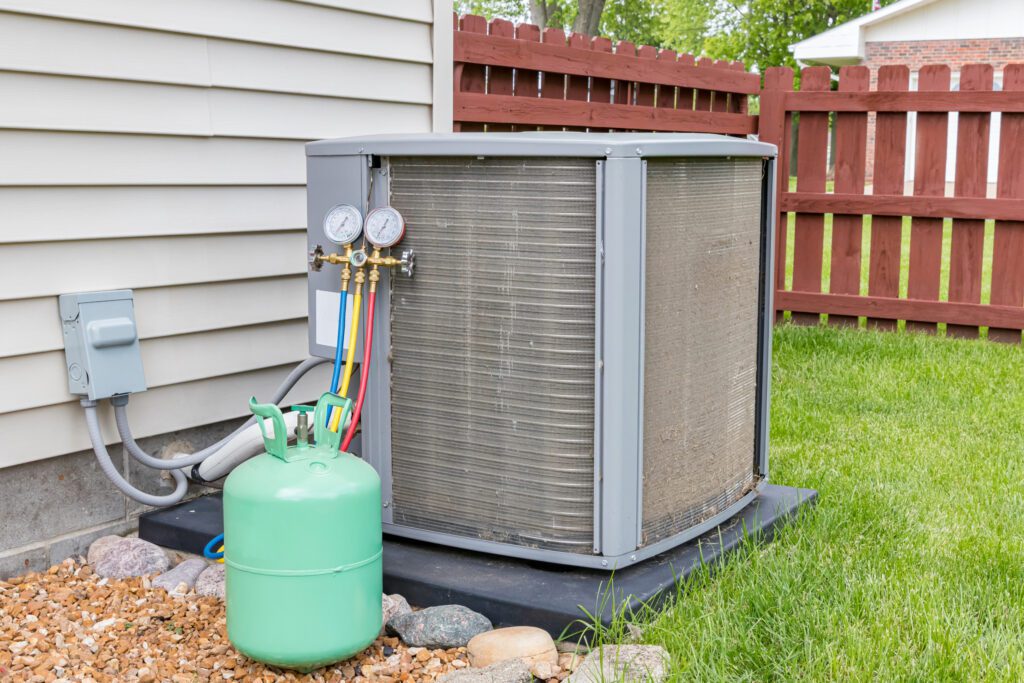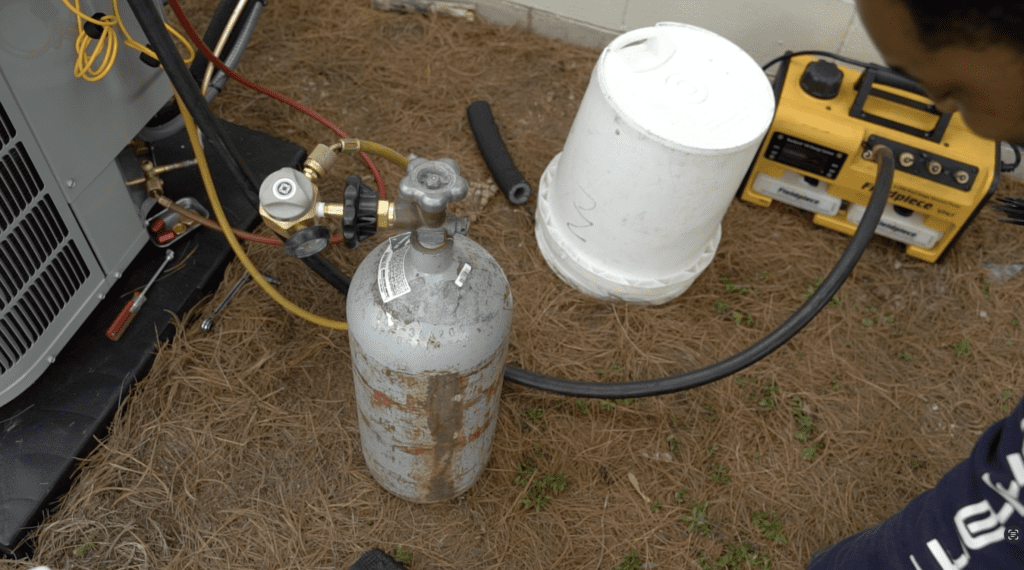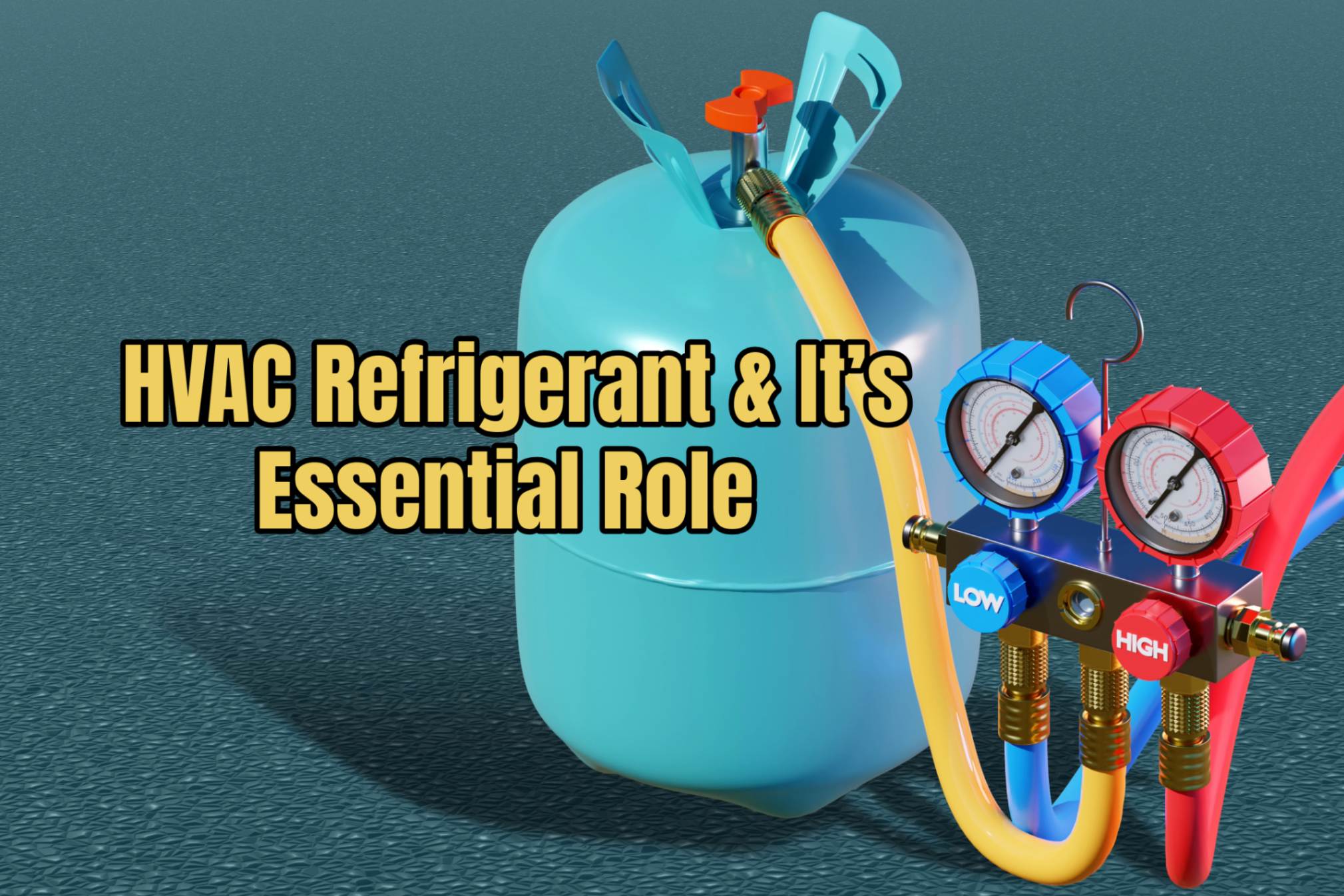Your HVAC system relies on HVAC refrigerant, as the body relies on blood. This vital substance moves through the system, absorbing and releasing heat to maintain a comfortable indoor climate.
When your system runs, refrigerant extracts heat from your home, helping to cool it before transferring that heat outside. Without it, your HVAC unit couldn’t function efficiently, proving refrigerant’s key role in energy conservation and climate control.
Therefore, maintaining a cozy indoor atmosphere heavily depends on the efficiency of HVAC systems. These systems incorporate various components and technologies to regulate temperature and elevate air quality. A vital element in this arrangement is the HVAC refrigerant. In this blog post, we’ll explore the significance of HVAC refrigerants, their role in air conditioning and heating mechanisms, and why selecting the right one is crucial.

What is an HVAC Refrigerant?
At its core, an HVAC refrigerant is a specialized substance utilized in heating, ventilation, and air conditioning systems to aid in heat exchange. It absorbs heat from the indoor environment and releases it outside, thereby contributing significantly to cooling and heating. This fluid shifts between liquid and gas phases within the closed system of an HVAC unit, ensuring effective heat transfer.
The Function of HVAC Refrigerant
The primary role of refrigerant in HVAC systems is facilitating heat transfer, enabling the cooling and heating functions. Here’s a breakdown of its operation:
1. Evaporation and Heat Absorption: Starting in a low-pressure gaseous state within evaporator coils, the refrigerant absorbs heat as indoor air passes over the coils. It then evaporates into gas, cooling the air, which is circulated back into the living space.
2. Compression: Once gaseous, the refrigerant is compressed, enhancing its pressure and temperature. This high-pressure gas moves to the condenser coils.
3. Condensation and Heat Release: Within the condenser coils, it releases absorbed heat to the outside air, returning to a liquid state. This cycle repeats, maintaining indoor climate and making refrigerants essential for efficient heating and cooling.
Why is Choosing the Right HVAC Refrigerant Important?
Selecting an appropriate refrigerant matters for various reasons:
– Energy Efficiency: The right refrigerant can enhance the energy efficiency of HVAC systems. Some types require less energy for heat transfer, which lowers utility costs.
– Environmental Considerations: Traditional refrigerants have often been replaced due to their harmful environmental impacts, such as contributing to ozone depletion and high global warming potential. Modern refrigerants follow strict environmental guidelines to be more eco-friendly.
– System Compatibility: Not every refrigerant suits every HVAC system. Using an incompatible type can cause inefficiencies, damage, and expensive repairs. Thus, knowing which refrigerant fits your system is vital.
– Safety: Using refrigerants safely is crucial, as some can be toxic or flammable. It is imperative for technicians to meet safety standards to avoid accidents during operation and maintenance.
The good news is all our HVAC technicians are NATE-certified, have extensive training and years of accumulated experience. So, you can rest assured, we will take care of the job efficiently and effectively!
Common HVAC Refrigerants
Below are some common refrigerants used in HVAC systems:
1. R-22: Previously widely used, it’s being phased out because of its ozone-depleting effects. Systems using R-22 are being replaced or upgraded with more eco-friendly choices.
2. R-410A: This refrigerant is a popular option for new residential air conditioning systems, known for its effectiveness and reduced environmental footprint compared to older options like R-22.
3. R-32: Increasing in popularity, R-32 offers higher efficiency and a lower global warming potential than R-410A, making it a top choice for modern systems.
Transition to Sustainable HVAC Refrigerants
With the growing focus on environmental issues, the HVAC sector is transitioning to more sustainable refrigerants. Regulations from initiatives like the Montreal Protocol and the Kigali Amendment regulate high-GWP refrigerants, paving the way for greener alternatives.
So, with that in mind, technological advancements are enabling the creation of HVAC systems powered by next-generation refrigerants, offering higher efficiency and environmental responsibility. Adopting these refrigerants aligns with global ecological objectives and prepares homes and businesses for future regulatory standards.

HVAC refrigerants are crucial for the performance of heating and cooling systems as they drive the heat exchange processes necessary to maintain a pleasant indoor climate. Selecting the right refrigerant is key to optimizing system performance, ensuring environmental stewardship, and adhering to legal requirements.
As mentioned earlier, we know that HVAC refrigerant functions as the lifeblood of the HVAC system, ensuring smooth operation and optimal performance. Staying informed about how it works helps you make the best decisions for your home. If you have any questions, don’t hesitate to ask—we’re happy to help!
Grove City Heating & Air is here to help you navigate your HVAC needs with expertise and eco-friendly solutions. Call us today at (614) 490-7540, or schedule an appointment online now by clicking here!
Cooling Tip! In the meantime, feel free to check out our blog on how to stay cool while waiting for your HVAC technician to arrive.






